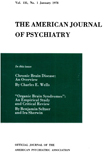THE EFFECTS OF PSYCHOTHERAPY ON THE COURSE OF ULCERATIVE COLITIS—A PRELIMINARY REPORT
Abstract
The primary purpose of this study was to evaluate the effects of psychological treatment, using objective physiological indices as the basic criteria. Emphasis was placed on using only data that were recorded at the time of observation, rather than retrospective data, which frequently are inaccurrate and misleading. The subjective reports of physicians and patients were not used.
It was possible to demonstrate that psychotherapy was related to an improvement in the physiological status. Over the total time period, the treated group showed a marked and sustained improvement, while the control group remained relatively status quo (Fig. 3). The higher curve of the treated group following psychotherapy is significant in that it indicates less physical impairment and a greater ability to function effectively. It was also observed that those patients who experienced favorable environmental changes (either through accident or as a result of psychotherapy enabling them to change their life situations) showed more improvement both physiologically and psychologically than patients who did not experience such beneficial changes.
Patients with both ulcerative colitis and schizophrenia have a poorer prognosis than the non-schizophrenic patients. This poor prognosis was apparent not only in terms of the eventual outcome of the disease, but also on the basis of the yearly recorded data.
No specific correlation appeared to exist between the degree of physiological improvement and the degree of psychological improvement. Nor could a favorable physiological response be correlated with the intensity, duration or type of psychotherapy. In general, those patients who did poorly from a psychological standpoint also tended to do poorly physiologically.
A continuation of this preliminary study and further investigation of the effects of psychotherapy on the course of ulcerative colitis will be reported shortly. On the basis of present findings, it is apparent that in terms of patient survival, amelioration of disease and adaptive response to chronic illness, a combined medical and psychiatric approach is most effective. There is a definite role for psychotherapy in the treatment of ulcerative colitis.
Access content
To read the fulltext, please use one of the options below to sign in or purchase access.- Personal login
- Institutional Login
- Sign in via OpenAthens
- Register for access
-
Please login/register if you wish to pair your device and check access availability.
Not a subscriber?
PsychiatryOnline subscription options offer access to the DSM-5 library, books, journals, CME, and patient resources. This all-in-one virtual library provides psychiatrists and mental health professionals with key resources for diagnosis, treatment, research, and professional development.
Need more help? PsychiatryOnline Customer Service may be reached by emailing [email protected] or by calling 800-368-5777 (in the U.S.) or 703-907-7322 (outside the U.S.).



